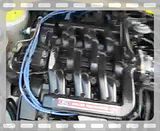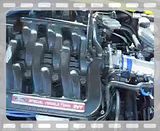kscontourkid
Veteran CEG'er
:help: I have a small tick in my new 3L and cannot figure out what it might be. using a screwdriver i have listened all over the engine and can only find one place where i can hear a tick at all. that is on the LIM. i have listened to the heads, the block, bank 2 exhaust manifold, water pump, tensioner pulley, valve covers, and the transmission case. i can only find a tick in the LIM.
here are 2 videos one under the hood and one inside the car looking at the tach. the engine is warmed up in these videos. i have a small exhaust leak and a few engine codes but they are irrelevant to a tick or knock.
the first video is under the hood. it is ticking/knocking at 5-8sec, 22-26sec, and 35-42sec in the video.
http://video.cardomain.com/Clip.aspx?key=F01B387A5D657C6D
the second video is in the car and you should here the tick only between 1k and 1.5k RPM. it is very prominent at 1250RPM
http://video.cardomain.com/Clip.aspx?key=5F74AF0D8A39666B
all help is appreciated. the engine has roughly 6K on it. clevite 77 main and rod bearings, new Ford oil pump, 98 block and heads with late 99 updated pistons(pistons only had 30K on when installed), new rings, gaskets, only thing i can think of is i timed the engine about 175 degrees out the first time but it turned all the way over prior to install without hang up. havent had any problems and compression tests passed on all cylinders. running 91 octane gas from Sams Club.
:help:
here are 2 videos one under the hood and one inside the car looking at the tach. the engine is warmed up in these videos. i have a small exhaust leak and a few engine codes but they are irrelevant to a tick or knock.
the first video is under the hood. it is ticking/knocking at 5-8sec, 22-26sec, and 35-42sec in the video.
http://video.cardomain.com/Clip.aspx?key=F01B387A5D657C6D
the second video is in the car and you should here the tick only between 1k and 1.5k RPM. it is very prominent at 1250RPM
http://video.cardomain.com/Clip.aspx?key=5F74AF0D8A39666B
all help is appreciated. the engine has roughly 6K on it. clevite 77 main and rod bearings, new Ford oil pump, 98 block and heads with late 99 updated pistons(pistons only had 30K on when installed), new rings, gaskets, only thing i can think of is i timed the engine about 175 degrees out the first time but it turned all the way over prior to install without hang up. havent had any problems and compression tests passed on all cylinders. running 91 octane gas from Sams Club.
:help:


